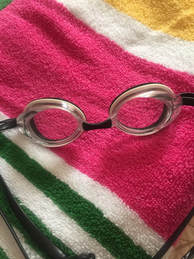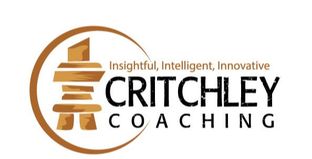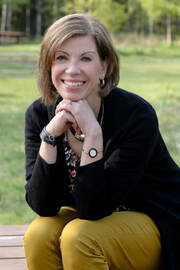
I was delighted that his goggles seemed to give me a great seal when I tried them on and mine seemed to fit Jim so we struck off for the lake on the weekend. My endurance had improved since our first attempt and we decided to swim the entire buoy line; twice. I learned to slow down a bit and this helped with my breathing. All in all, I felt like the swim was a significant improvement. Afterward, I removed the goggles, dried off, sat on the shore for a few minutes feeling pretty good about my effort. I was smiling at the other swimmers and at the children playing in the water. Leaving the park and on the way home I greeted the people I saw with a big smile. I was full of confidence after my successful swim.
Much to my horror, when we got home and I looked in the mirror, I saw that my goggles had done such a good job of sealing that they had made what looked like a permanent dent in the skin below my eyes; sort of like a sock makes when the elastic is a bit tight on the leg. To make matters worse, not only was there an indentation, there was also some brown bruising, caused by the extremely good seal! Apparently, I had inadvertently put the goggles near the tops of my cheeks and then stretched the skin up as I covered my eyes. This had the effect of not only giving the best possible seal but also of making me look like I’d been on the losing side of a bad fight. Once I got over the horror of how I looked, and the worry of whether this would last until this weekend when I have a speech to give at a wedding followed by a workshop to facilitate in Ontario, I started laughing about what people must have thought when this soaking wet, delighted-with-herself woman, was beaming at them with her face looking like a four-year-old had put eye makeup on her with a marker!
And of course, it got me thinking about how this happens in other areas of life too. This is, in coaching, what we call a blind spot. A blind spot by definition, is an area where a person’s view is obstructed. In this case, I had no idea what I looked like. I couldn’t see myself. I couldn’t figure out why people were looking at me with that kind, but confused, look.
Each of us has many blind spots in our lives. Blind spots might occur when we don’t recognize that a behaviour of ours is what is causing us problems. We may think that we are behaving in a way that is acceptable or that is best for a situation, when in fact our behaviour may simply be something that we are used to but that is not working at all. Other people can clearly see what is not working, but we, who are in the midst of it, cannot.
I was visiting with our friend Deista at a recent wedding. Deista was our first nanny; she lived with us for two years when Kaitlyn was born. Deista was telling me about a few blind spots that she had discovered she had when she lived with us. She said that she could not figure out why I would be looking forward to jim arriving home after work. She could see that I was happy to see him and that Kaitlyn was delighted to have her dad home. Deista said that she realized that growing up in her house, the times when her Dad was coming home were always tense. Her Dad was an alcoholic and they never knew how he would be when he arrived. It took her by complete surprise that there was an alternate way of feeling when a father arrived home. She gave me a second example of recognizing one of her blind spots. She explained that when she went to university and a doorbell rang at her house that she shared with roommates, it didn’t seem to be frightening for them. She noticed that when she heard the bell, she became startled and then silent, but the rest of them just continued on normally and answered the door. Again, her early training was that the doorbell might signify creditors, so she had been taught to be silent when the bell rang. (To read an earlier blog about Deista check out ‘Who Cares’, from 2016)
Deista is now at a place in her life, where she is years away from her upbringing, and she wisely told me, ‘I’m glad that I’ve been able to recognize these two things, but I always wonder what things I do, that I don’t even realize aren’t needed anymore’ These are her blind spots. The good news for Deista is that she is on the lookout for hers; many people do not even know they have blind spots.
There is another way that blind spots can appear for us. Blind spots do not only keep us from seeing weaknesses in ourselves; we may be blind to some of our good qualities and skills too. For instance, if you happen to be a photography enthusiast and people see your photos, you may get asked to take some pictures for a special event. Often, a first response is, ‘Oh, I couldn’t. I just do this for a hobby.’ The story you are telling yourself is the same story you may have been telling yourself for years, ‘I’m still learning. I’m not ready to declare myself a photographer yet’. This may be a blind spot. In this case, others see you as a gifted photographer. You, however, are blind to how much your skill has improved and to how you are now seen by others.
One way to help us recognize our blind spots is to do what Deista did. She was an observer of her environment and she looked for feedback to see how her response compared to that of others. When she recognized that it was her who was thinking differently, she dared to question her own long held belief. Similarly, with the fictional example of the photographer, noticing that the way you see yourself is very different from how others see you, may allow you to dare to think that you are ready to step into a new role.
For me this week, the mirror was what revealed my ‘blind spot’. Once I could see how others were seeing me, I was able to adjust. Concealer worked for me, but it isn’t what I recommend for most blind spots!
As you head into this week, see if you can uncover a blind spot you might have. To begin, try to notice a place where you have a skill that you haven’t yet allowed yourself to own, but that others clearly see. Then try to change your language around how you talk about this to yourself and to others.
My inquiry for you this week is, “What blind spot may I have here?”
Book a coaching session with Elizabeth to help uncover some of your blind spots. Elizabeth provides coaching for individuals and for groups. She also facilitates custom workshops for teams, groups and businesses.


 RSS Feed
RSS Feed